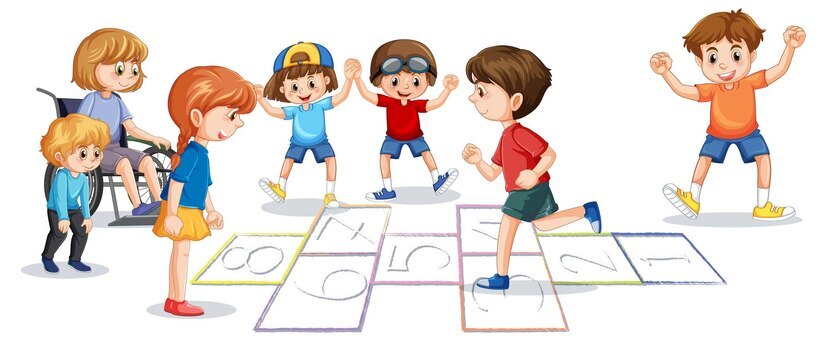



The Role of Play in Daycare: Why It’s More Than Just Fun

Discover why play is essential in daycare settings beyond just fun. Learn about the importance of children's play and how various children’s games support cognitive, social, emotional, and physical development. Play is an essential component of early childhood development, and in daycare settings, it serves far more purposes than merely entertaining children. While it’s often seen as just fun and games, the role of play in daycare is deeply rooted in fostering various aspects of a child’s grow




Understanding the Importance of Children’s Play
Play is a natural and fundamental way for children to learn about the world around them. In daycare settings, play is not just about passing the time; it is a vital part of the learning process that contributes to a child’s cognitive, social, emotional, and physical development. Understanding the importance of children’s play helps caregivers and parents appreciate the broader benefits that play provides.
Cognitive Development: Play stimulates cognitive development by encouraging children to explore, experiment, and problem-solve. Activities such as building blocks, puzzles, and pretend play require children to use critical thinking and creativity. Through these activities, children learn to make connections, understand cause and effect, and develop their problem-solving skills.
Social Skills: Interaction with peers during playtime helps children develop essential social skills. Playing games with others teaches them how to share, take turns, and cooperate. These social interactions are crucial for building friendships and understanding social norms. Through play, children learn to negotiate, communicate, and resolve conflicts, all of which are important for their social development.
Emotional Growth: Play provides an outlet for emotional expression and helps children manage their feelings. Engaging in various activities allows them to explore and understand their emotions in a safe and supportive environment. Role-playing and imaginative games can help children express their fears, anxieties, and joys, contributing to emotional resilience and self-awareness.
Physical Development: Physical play is equally important, as it helps children develop their motor skills and overall physical health. Activities like running, jumping, and climbing improve their coordination, strength, and balance. Fine motor skills are enhanced through activities such as drawing, manipulating small objects, and playing with playdough.
Types of Children Games and Their Benefits
Different types of children’s games serve various developmental purposes, making them valuable tools in a daycare setting. Here’s a look at how various games contribute to children’s development:
Imaginative Play: Imaginative or pretend play involves children using their creativity to role-play different scenarios. This type of play allows children to experiment with different roles and situations, which enhances their creativity and problem-solving skills. For instance, playing "house" or "store" helps children understand social roles and practice real-life skills in a fun, engaging way.
Physical Games: Physical games such as tag, obstacle courses, and dancing are excellent for developing gross motor skills. These activities help children improve their coordination, strength, and flexibility. Additionally, physical play is essential for promoting a healthy lifestyle and preventing obesity.
Constructive Play: Constructive play involves building and creating, such as with blocks or construction sets. This type of play supports cognitive development by encouraging spatial awareness, planning, and problem-solving. Constructive play also helps children develop fine motor skills and hand-eye coordination as they manipulate objects and create structures.
Educational Games: Educational games, such as those involving numbers, letters, or shapes, help reinforce learning in a playful manner. These games make learning fun and interactive, allowing children to practice essential skills like counting, recognizing letters, and understanding basic concepts. Educational games can also be tailored to different learning levels, ensuring that all children are engaged and challenged appropriately.
The Role of Caregivers in Facilitating Play
While children naturally engage in play, caregivers play a crucial role in facilitating and enriching their play experiences. Here’s how caregivers can support the importance of children’s play in a daycare setting:
Creating a Stimulating Environment: Caregivers should ensure that the play environment is rich with diverse and age-appropriate materials. This includes providing a variety of toys, games, and activities that cater to different interests and developmental needs. A well-organized and stimulating environment encourages children to explore and engage in meaningful play.
Encouraging Social Interaction: Facilitating opportunities for children to play together promotes social development. Caregivers can set up group activities and encourage cooperative play, helping children learn to work together and build relationships with their peers. It’s important for caregivers to guide and support children in resolving conflicts and understanding social cues.
Observing and Supporting Development: Caregivers should observe children during play to understand their interests and developmental needs. By actively participating and guiding play, caregivers can provide support and encouragement, helping children develop new skills and overcome challenges. It’s essential to strike a balance between allowing children to lead their play and providing gentle guidance when needed.
Incorporating Learning Opportunities: Play can be used as a tool for learning by incorporating educational elements into activities. Caregivers can use playtime to reinforce concepts such as numbers, letters, and social skills. For example, playing counting games or sorting activities can help children practice their math skills in an engaging and enjoyable way.
Conclusion
The role of play in daycare extends far beyond mere entertainment. The importance of children’s play is evident in its numerous benefits for cognitive, social, emotional, and physical development. Through various children’s games and activities, children learn essential life skills, express their emotions, and develop their creativity. Caregivers play a vital role in facilitating and supporting play, creating a nurturing environment that enhances children’s growth and learning.
By recognizing and embracing the value of play, daycare centers like Kidzee can provide a rich and supportive experience that sets the foundation for lifelong learning and development. Play is indeed more than just fun—it is a crucial component of a child’s early education and overall well-being.
